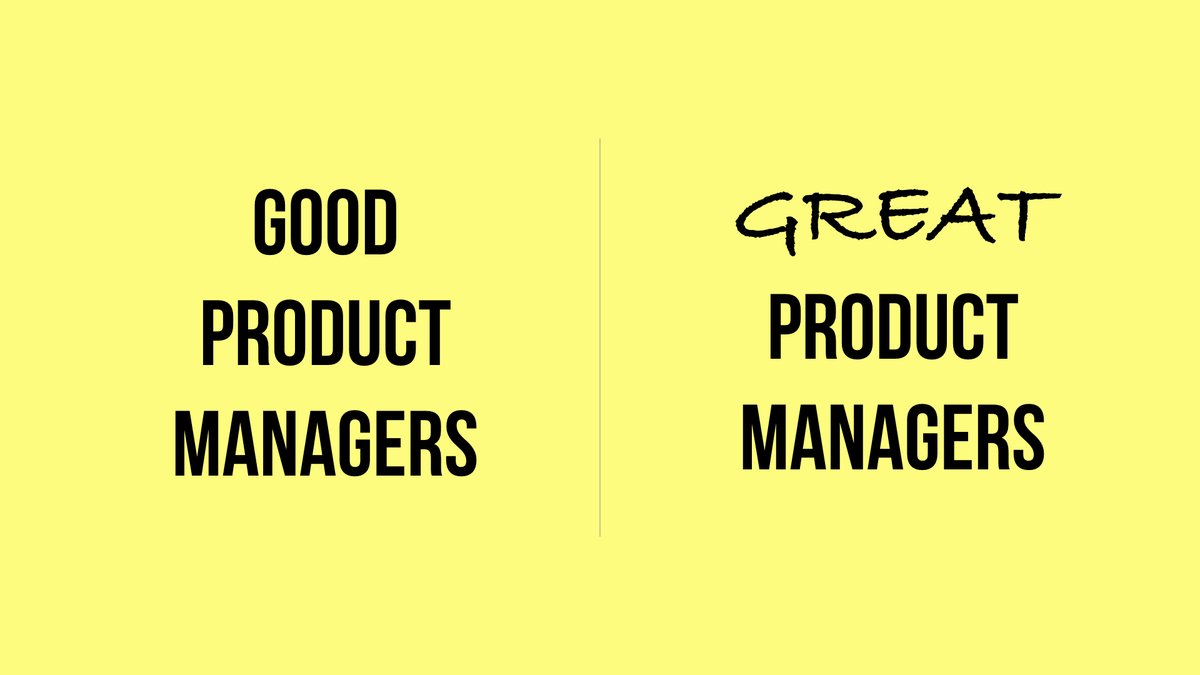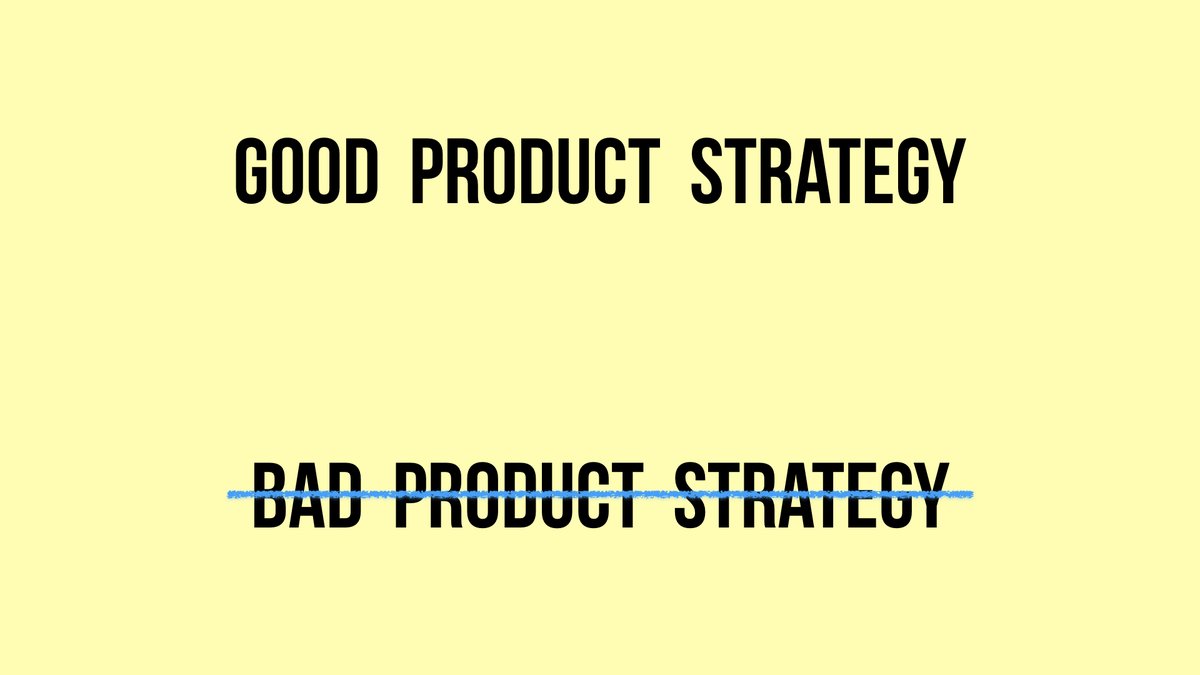Good PMs consistently deliver quality products and results. Great PMs consistently and singularly improve the company’s trajectory through the products they work on.
Good PMs make metrics-driven product decisions. Great PMs make metrics-informed product decisions. Great PMs are masters of the art of blending quantitative and qualitative inputs, as warranted by each individual situation.
Good PMs extensively research the domain in which their product operates. Great PMs become the worldwide experts in that domain. When new to a domain, great PMs bootstrap this process by seeking the counsel of existing worldwide experts.
Good PMs are proactive about doing user research to identify & fix UI issues in their product. Great PMs have a broader view of the value of user research. Great PMs are diligent about using a variety of user research methods to inform what product to build in the first place.
Good PMs make product decisions based on a thoroughly logical and rational view of the world. Great PMs view logic and reason as important tools, but they also know that people—and therefore the users & customers of their product—are driven by emotion more than by logic.
Good PMs know the importance of talking to customers frequently. Good PMs listen intently to customers to develop their product hypothesis. Great PMs also listen to what isn’t said and anticipate where the industry overall is headed when developing their product hypothesis.
Good PMs inspire their teams with their creative product ideas to get their buy-in. Great PMs know that buy-in isn’t enough; you need passion & ownership to build great products. Great PMs facilitate discussions that get the entire team to come up with creative product ideas.
Good PMs seek to validate their ideas & instincts with trusted colleagues. They often ask: “Does this make sense?” Great PMs make it as easy as possible for colleagues to push back on their ideas & instincts. They often ask: “What am I getting wrong?”
Good PMs are detail-obsessed, making sure that the product meets the desired quality bar for launch. Great PMs pay this degree of attention to the entire customer experience: they know that the docs, the API, blog post, website, support emails, etc. are also “the product”.
Good PMs can make convincing arguments to support their point of view. Great PMs can also make convincing arguments to support the opposite of their point of view.
Good PMs write detailed and lucid product requirements documents (PRDs). Their teams become highly reliant on these PRDs to make forward progress on engineering & design tasks. Great PMs iteratively write their PRDs so engineering & design tasks are rarely blocked on them.
Good PMs work hard, are always extremely busy, and are often overwhelmed. Great PMs work hard but are rarely overwhelmed. Great PMs understand task leverage and spend the majority of their time on the highest-leverage tasks for the company. Great PMs also delegate frequently.
Good PMs over time converge on a set of tools & processes that they trust—sprints, OKRs, RICE,... Good PMs introduce these to all their teams for better execution. Great PMs are more adaptive—they have a wider repertoire that they expertly tweak for each specific team's needs
Good PMs understand the value of infra-work, but they advocate for more eng time to be spent on features that meet customer needs. Great PMs advocate for infra & tech debt work because they care as much about uptime, latency, dev productivity as they do about new feature-work
At product reviews, Good PMs provide thoughtful answers to executives’ questions. Great PMs see their role as being greater than just answering execs’ questions. They know that product reviews are a joint truth-seeking process and so they often reframe execs’ questions.
Good PMs usually deal in answers and data. Great PMs usually deal in questions and wisdom.
Good PMs are outstanding problem solvers. Great PMs are outstanding problem preventers. Great PMs are discerning about which problems to prevent, which problems to solve, and which problems not to solve.
Good PMs try their best to deliver optimal results for a given product strategy. Great PMs first ensure that the product strategy itself is optimal. Great PMs know that their team’s time is too precious to be squandered away on impeccable execution of a flawed strategy.
Good PMs can describe their product strategy over the course of a short elevator ride. Great PMs ensure that their team members can also describe the product strategy over the course of a short elevator ride.
When their products do well, Good PMs use the spotlight to give credit to the builders i.e. team members who worked to build the product (eng, design, research, analytics). Great PMs remember to also give credit to the enablers (mktg, legal, sales, support, operations, ...)
When their products fail, Good PMs run a post-mortem to assess reasons for the failure and improve their future approach. Great PMs, in the rare instances of product failure, improve not just their own approach but they also share the lessons learned with the broader company.
Good PMs weave stakeholder concerns (legal, security, ...) into their plan & get their approval well before launch. Great PMs know that these groups aren’t approvers, they’re advisors. With due consideration, great PMs ultimately decide what’s best for users & the business.
Good PMs follow & espouse the company’s product principles to build better products & to eliminate decision deadlocks. Great PMs edit the company’s product ethos—they identify the unintended flaws in the principles, fix the flawed parts—and only then follow & espouse it.
Good PMs move heaven and earth to meet their team’s quarterly goals & targets. Great PMs always think a few levels higher than their current place in the org: they will happily sacrifice their team’s goals & targets when it's in favor of the greater good for the company
Good PMs are keen students of the company’s PM career ladder; they often evaluate their ladder progression w/ their manager. Great PMs know that career ladders are imperfect proxies: they’re more fixated on tangible competence & impact than on checking off boxes on the ladder
Good PMs find a way to motivate themselves to deliver value despite being at odds with the company’s values. Even within rapidly deteriorating cultures, they pledge to go down with the ship. Great PMs know when it’s time to disembark amicably & muster up the courage to do it.
Good PMs seek “PM-driven” companies as a way to make an impact in their role as PMs. Great PMs know that “PM-driven” companies are rarely able to create superb products. Great PMs seek “product-obsessed” companies where Eng-Design-PM-DataScience operate as equals.
Good PMs constantly learn about the craft of product mgmt through the projects that they take on at work. Great PMs also learn through work projects, but they learn a lot more about their craft in their personal time because of their curiosity & passion for self-improvement.
Good PMs attain conventional career success at pretty high rates. Great PMs also attain conventional career success. In addition, Great PMs attain a higher form of success: which is to have helped others around them find flow and fulfillment.
And I don’t know any Great PM who does all of the above, all of the time.
That’s because Great PMs know that these ideas should be viewed as signposts, not as commandments.
You don’t have to do everything that Great PMs do at once—start with what resonates above, see how that feels, see how that makes others feel, and iterate.
And for that I wish you all the best!
♥️




